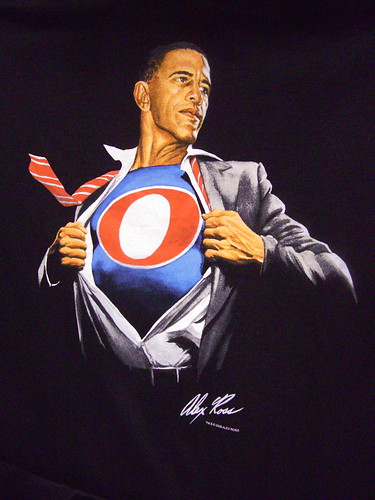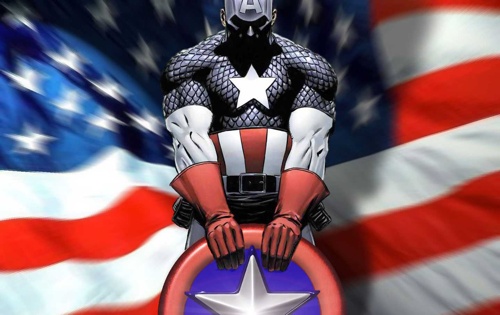
President reveals priorities with 62 day wrap-up
The reason I enjoy following the day to day workings of Washington politics is the same reason I like watching full sports seasons; consequences. For D.C. pols, there are scorecards, games, and wins.
Two months into his presidency, Barack Obama's 4 year fight is taking shape. Predictably, his Republican opponents, and even his more moderate supporters, will forever accuse him of being too ambitious in spending and policy. He is, after all, a Democrat, and so that is his eternal cross to bear.
And then, of course, there is the War. Obama's war to save the economy (or war on the economy, depending on your side of the line) is the crux of this term. It is pretty much a winner-take-all gambit to convince the American people to re-up his contract in 4 years, and re-up his teammates in 2. But he has a plan.
Obama's plan is almost bafflingly consistent with the tenets he laid out in his policy/ memoir Audacity of Hope. The only way to engender solvency in our nation as a whole, the only way to balance the books, is to take a multipronged approach. These are not luxury issues he and his team are attacking, these are the fundamental keys to rebuilding American prosperity and remembering promise.
The keys are A) To overhaul healthcare, and reduce its crippling burden on our society at large.
B) Create an environment where clean energy is the profitable sort of energy, and ease our transition away from dependence on trade with volatile nation states.
C) Finally, the old political standby, reinvest in education. The only added wrinkle is that this time, if we don't commit to optimizing the values of educations K-12 and beyond, we will lose vital ground to foreign workforces.
These are the president's primary tenets. Respect and work with them, he tells us, and we can spur on economic growth, and reduce our federal deficit.
There was intrigue in this press conference beyond the obvious. Once the president had finished his opening statement, the game of D.C. media favoritism began. Make no mistake, there was an order of operations to Tuesday night's national televised presser. The order in which Obama took questions was a tangible way to break down the priorities of the White House. This was PEMDAS for POTUS. The following is the order in which news outlets were called upon for questions, with a quick summary of the direction of their questioning.
1)Associated Press
2)NBC News
3)ABC News
4)CBS News
The first round of questions were the most obvious ones. Essentially, all the heaviest of news' hitters went straight for the politics of the budget. They took varied tones, notably with NBC's Chuck Todd providing his usual brand of hero worship, and CBS going hard at the realities of the deficit projections of 5 years down the line and beyond. The president was nimble and up front, facing the realities while being forceful in his belief in his policies. The AP gets out to all the news outlets in America, and it was the 3 major networks that had forked over the prime-time programming slots to the president's agenda, so there was no surprise in giving the respect to give them all the first pass. It was after this obvious opening that things got interesting.
5) Univision: They asked about the growing fear of Mexican drug wars.
6) Stars and Stripes/ Stripes.com: Military spending cuts and the implications.
7) CNN: AIG outrage
8) Fox News: China and international threat to the dollar.
I thought it was really noteworthy that Obama took the effort to go to the Spanish language news, and then veterans affairs news, before addressing the cable news crowd. There was some gamesmanship there, to be sure, because it wasn't as if the order were set based on ratings. In any case, it was good to see Fox News put in their place. This order revealed a desire to speak directly to the people, not the talking heads that tell them what to believe.
9) Politico: Taxes, and charitable donation writeoffs.
10)Ebony: Tent cities, and homelessness among youth.
11)ABC Radio: Race in the White House.
12)The Washington Times: Embryonic Stem cell and scientific policy.
13)Agence France-Presse: Israel and the Middle East.
A couple change-ups here, with Obama making a point to open the forum to crowds that may not always receive the deference of the so called “media elite.” Politico was characteristically inside-policy, taking on an issue that dealt with real numbers and hard realities. Ebony went for a deeply social issue, hoping to bring the conversation to the inner struggles of the American people. Talk radio seemed downright shocked to be given the floor, and went for the kind of pointless controversy that perpetuates talk radio; race baiting. The Washington Times went for the thinking man's controversy, digging in to the reclamation of science, while the AFP gaged Obama's understanding of delicate foreign issues.
And that was that. Within an hour, President Obama had answered direct questions on each and every major issue that his administration has tackled in its opening sprint. He was accessible, thorough, and consistent. He took the last question from the AFP as an opportunity to sum up his principals, and convey why they were interdependant. Unlike his detractors, he has a plan, and it is comprehensive.
Seeing the line of questioning in total gave a sense of just how much the administration has already taken on, and already accomplished. There are arguments to be made on either side of the aisle, to be sure, but there has been no attempt to back down from any of the issues, or to shut down any line of questioning. This, we can only hope, is what transparency looks like.
The president takes off to confer now with the rest of the world. This will be an ordeal, to be sure, as the rest of the G20 finally come face to face with the new leader of the free world. This latest media blitz by the White House seems to draw a curtain on the administration's infancy. It is the end of the beginning. We know the problems we face, and we've got a man with the plan at the helm. As he said, the nation is not a speedboat, it is an ocean liner. We're beginning to find out just what sort of navigator he is.














